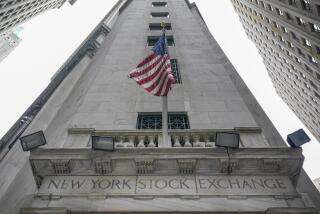Greenspan Sees Danger in Wave of Bank Mergers
- Share via
WASHINGTON — Federal Reserve Chairman Alan Greenspan said Monday that bank regulators must keep a closer eye on “megabanks,” forming in a flurry of international mergers, because they could threaten the global financial system if they were to fail.
Without offering any details, Greenspan promised that important changes “are in the pipeline” by regulatory agencies both in the United States and abroad.
His warning sent a signal not only to banks but also to their customers, creditors and investors that the Fed is concerned about today’s trend toward concentration in the financial services industry.
“A one-size-fits-all approach to regulation and supervision is inefficient and, frankly, untenable in a world in which banks vary dramatically in terms of size, business mix and appetite for risk,” Greenspan said in a speech to the American Bankers Assn. annual meeting in Phoenix.
The wave of consolidations involving companies from the banking, securities and insurance industries is creating complex giants that may be beyond the ability of regulators to understand, let alone control, said Bert Ely, a financial industry consultant in Alexandria, Va.
“These companies may be too complex for their own managers to understand, let alone the poor regulators,” Ely said in an interview.
“Everybody knows there is a problem and is agonizing about it--the challenge for Greenspan is what will be done to assure that these giant institutions operate soundly,” he said.
Not only are there fewer banks in the nation, but the top banks hold a larger share of the banking system’s financial assets.
Greenspan’s remarks showed that the Fed chairman wants to walk a difficult, narrow path, hoping to prevent a disastrous financial failure, without providing any bailouts.
International rules provide for standards on the amount of capital held by banks, but this may be insufficient protection as the financial giants become bigger and more complex, experts believe.
The “megabanks being formed by growth and consolidation are increasingly complex entities,” Greenspan said in his Phoenix speech. “Even among the largest banks, no two institutions have exactly the same risk profiles, risk controls or organizational and management structure.”
In recent years, Travelers Corp., a giant of the brokerage and insurance business, merged with Citicorp, a huge bank. BankAmerica and NationsBank combined to create a bicoastal financial giant.
Regulatory oversight must be careful and precise, Greenspan argued, noting that “the more complex an institution’s business activities, the more sophisticated must be our approach to prudential oversight.”
The giant financial institutions “create the potential for unusually large systemic risks in the national and international economy should they fail,” he said.
“No central bank can fulfill its ultimate responsibilities without endeavoring to ensure that the oversight of such entities is consistent with potential risks,” Greenspan said.
“At the same time, policymakers must be sensitive to the trade-offs between more detailed supervision and regulation on one hand, and . . . the smothering of innovation and competitive response on the other,” he said.
Greenspan would like the banks to do a better job of understanding the risks they are taking and then disclosing those risks to the public.
Finding the way to implement this new and flexible regulatory approach will be difficult, Greenspan conceded.
“The best way to encourage more disclosures is not yet clear. Our intent is to consult with the industry regarding establishment of new disclosure standards and ways to evaluate their application,” he said.
If regulation is too heavy, everyone will expect that governments will bail out failing banks, Greenspan believes. Instead, the correct approach would keep the element of risk in the system, so that creditors and investors can discipline an errant institution by going elsewhere.
However, there are limits to this hands-off approach.
The Fed’s worries also extend outside the realm of banks.
Last year, when Long Term Capital Management, a giant hedge fund, suffered huge losses, the Fed arranged for the fund to receive financial aid. The fear was that Long Term Capital had borrowed so much that its collapse could have jeopardized some major banks.
More to Read
Inside the business of entertainment
The Wide Shot brings you news, analysis and insights on everything from streaming wars to production — and what it all means for the future.
You may occasionally receive promotional content from the Los Angeles Times.










